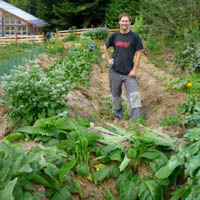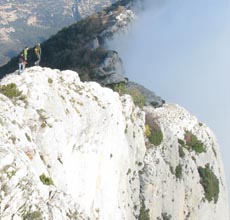


|
Joined:
|
30/07/2012 |
|---|---|
|
Last Updated:
|
28/10/2013 |
|
Location:
|
Catalunya, Barcelona, Spain |
|
Climate Zone:
|
Mediterranean |
|
Gender:
|
Male |
|
Web site:
|
www.12pdesign.net |
(projects i'm involved in)
Back to Alfred Decker's profile
Posted by Alfred Decker about 11 years ago
http://www.ecodharma.com/courses-events/permaculture-nature-connection-deep-ecology
6th to 13th Sept 2014
This course explores both the practical wisdom and the theoretical underpinnings of a shift to a life-sustaining future – set within a framework of nature and dharma based learning. It draws together the practical wisdom of permaculture design, experiential nature-based practice, and the theoretical foundations of deep & radical ecology. It weaves together study, meditation, and hands on learning.
During the course you will:
The permaculture component offers practical skills for designing and creating sustainable living systems, integrating human needs with the ecosystems in which we are rooted. The nature-based, dharma and meditation practices provide tools and a rich experiential context which support personal transformation. Meanwhile the study based aspect exploring radical and deep ecology provides a clear and structured framework for exploring our views and intellectual understanding of ourselves and the world we inhabit.
Each of these strands of the course integrate with each other in a holistic way, to equip you with inspiration, knowledge, skills, and a deeper capacity to understand and respond to the challenges of our times.
Suggested contribution in the Dana Economy €400 to €150 (euros). Make a booking.
Permaculture is a theory of ecological design which seeks to develop sustainable human settlements and agricultural systems, by modelling them on the diversity, stability and resilience of natural ecosystems. Developed in the 1970’s, it offers a core practical contribution to the creation of a sustainable future.
The term “permaculture” was originally coined to refer to the idea of a truly sustainable agriculture, but has expanded to embrace the idea of “permanent culture” in recognition that the social dimension is integral to truly sustainable living systems. It has been described as “a philosophy of working with, rather than against nature; of protracted and thoughtful observation rather than protracted and thoughtless labour; and of looking at plants and animals in all their functions, rather than treating any area or thing in isolation.”
 Permaculture
draws from several disciplines including organic farming,
agro-forestry, sustainable development, and applied ecology. The design
principles which are the conceptual foundation of permaculture are
derived from the science of systems ecology and study of pre-industrial
examples of sustainable land use. The primary agenda of the movement has
been to assist people to become more self reliant through the design
and development of productive and sustainable gardens and farms. It
applies equally well to both rural and urban areas. Permaculture can
also be called simply, “a revolution disguised as gardening.”
Permaculture
draws from several disciplines including organic farming,
agro-forestry, sustainable development, and applied ecology. The design
principles which are the conceptual foundation of permaculture are
derived from the science of systems ecology and study of pre-industrial
examples of sustainable land use. The primary agenda of the movement has
been to assist people to become more self reliant through the design
and development of productive and sustainable gardens and farms. It
applies equally well to both rural and urban areas. Permaculture can
also be called simply, “a revolution disguised as gardening.”
During the Permaculture component of the course, participants will learn:
 At
the Ecodharma Centre, we know ourselves the transformative and
integrative power of immersion in non-human nature. We want to support
others to re-connect with that source of nourishment, well-being, and
inspiration. So, integrating insights and methods from both dharma and
ecological sources, we apply an approach that we call Nature Based
Practice and Learning.
At
the Ecodharma Centre, we know ourselves the transformative and
integrative power of immersion in non-human nature. We want to support
others to re-connect with that source of nourishment, well-being, and
inspiration. So, integrating insights and methods from both dharma and
ecological sources, we apply an approach that we call Nature Based
Practice and Learning.
Connection with wild nature is an important aid to developing an ecological sensibility and sense of connection with the web of life. This can support action towards a sustainable future for all. These experiences can be nourishing, enriching, and can demand that we radically re-orientate our sense of who and what we are.
In simple terms Nature Based Practice and Learning involves supporting participants to spend time out in the wilds connecting with the teachings nature offers. We use tools such as mindfulness practice and meditation in conjunction with elements of bushcraft, nature based education, as well as ecological and evolutionary learning, and solo time in wild nature.
The Ecodharma Centre is based in an extraordinary and wild place. From this supportive base, Nature Based Practice and Learning can help us step out of the human-centred world for a while – to wander deep into tangled woodland, to lie on mossy rocks, to sit in limestone caves, to traverse lofty ridges, and to loll on the edge of trickling streams. There we find something else.
Deep Ecology offers a view of life which does not separate humans out from the natural environment, recognising the world as a network of phenomena that are fundamentally interconnected and interdependent. Drawing on systems theory and the life sciences, Deep Ecology recognizes the intrinsic value of all living beings and views humans as one of many strands in the web of life.
Ultimately, deep ecological awareness implies a spiritual or religious awareness. It encourages a shift in consciousness from an alienating sense of separateness to one of belonging, of connectedness, to the natural ecosystems on which we depend. to support this shift it often incorporates experiential approaches such as The Work That Reconnects and nature-based learning.
Deep Ecology asks ever deeper questions about the very foundations of our modern, scientific, industrial, growth-oriented, materialistic worldview and way of life. It challenges this paradigm from an ecological perspective – from the perspective of our profound interconnectedness with one another, with future generations, and to the web of life.
Social Ecology augments Deep Ecology with an analysis of the way in
which patterns of social organisation are central to the current
ecological crisis. Social ecologists and ecofeminists have pointed out
how the exploitation of nature has gone hand in hand with the
exploitation of other humans in various hierarchical, militaristic,
capitalist and industrialist forms. They point out that social
transformation does not simply unfold from a change of consciousness,
but also requires radical restructuring of the socio-economic system.
Where Deep Ecology has emphasised the psychological, spiritual, and
cognitive aspects of the ecological crisis, social ecology emphasises
the socio-political dimensions.
Drawing from both Deep Ecology and Social Ecology, Radical Ecology seeks to champion a sustainable and socially just world through the transformation of both our individual consciousness and our social-economic systems. Radical ecology is not a monolithic movement, nor does it suggest a fixed ideological position. Radical ecology is a critical encounter, a working out through thought and praxis, of how we can resist the destructive march of the industrial growth socio-economic system and effect the changes necessary for a new way of living in full partnership with the natural world. It includes work and experiments in non-hierarchical social forms, new economics, process oriented science, and a revitalised spirituality.
This component of the course will:
Suggested contribution in the Dana Economy €400 to €150 (euros). Make a booking.
The course facilitators:
Guhyapati is the founder of the Ecodharma Centre, with
over 25 years experience of both Buddhism and radical ecology. He is a
talented teacher of Buddhism and meditation, with well developed skills
in holistic-participatory learning for empowering groups and individuals
for personal and social transformation. He is also a highly experienced
mountain and wilderness guide.
Alfred Decker is a permaculturist and activist who has
been active with social movements throughout Europe and the Americas. He
is about to complete his master’s degree in sustainable architecture
and renewable energy.
You must be logged in to comment.

| Permaculture Design Certificate (PDC) course |
| Type: Permaculture Design Certificate (PDC) course |
| Verifying teacher: Penny Livingston-Stark |
| Other Teachers: Brock Dolman |
| Location: Occidental Arts & Ecology Center, California |
| Date: Feb 1998 |

| Permaculture Teacher's Training |
| Type: Teacher Training |
| Teacher: Rowe Morrow |
| Location: Stainz, Austria |
| Date: Jul 2011 |

| Permaculture Teacher's Training |
| Type: Teacher Training |
| Teacher: Rowe Morrow |
| Location: Vale de Lama, Portugal |
| Date: Apr 2012 |

| Diploma: Education & Community Development |
| Type: Permaculture Diploma |
| Teacher: Rosemary Morrow |
| Location: Blue Mountains Permaculture Institute |
| Date: Jul 2011 |
| 7 PDC Graduates (list) |
| 0 PRI PDC Graduates (list) |
| 16 Other Course Graduates (list) |
| have acknowledged being taught by Alfred Decker |
| 0 have not yet been verified (list) |
| Alfred Decker has permaculture experience in: |
|---|
| Cool Temperate |
| Mediterranean |
| Semi Arid |